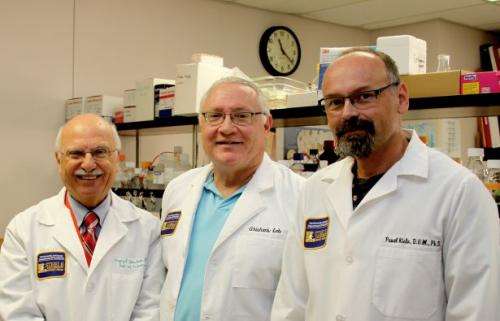'Molecular truck' could deliver new treatment

University of Arizona researchers have developed a novel drug and delivery system to treat inflammation and ulcerations in the colon.
The system, a carrier drug the research team has termed a "molecular truck," shows promise in treating ulcerative colitis, one of the two forms of inflammatory bowel disease, or IBD.
The development and testing of the molecular truck was completed by Eugene A. Mash Jr., a professor in the Department of Chemistry and Biochemistry, College of Science; pediatric gastroenterologist Dr. Fayez K. Ghishan, head of the Department of Pediatrics and director of the UA Steele Children's Research Center, College of Medicine – Tucson; and Pawel Kiela, an associate professor in the Department of Pediatrics and a Steele Center researcher in the area of gastroenterology.
"This drug has the potential to be a major advancement in the treatment of infants and children with ulcerative colitis, who have difficulty taking available medications," Ghishan said.
The study was published in the August 2012 issue of ACS Medicinal Chemistry Letters. Now the invention is patent-pending, and the researchers are working closely with Tech Launch Arizona (link sends e-mail) on the intellectual property and commercialization aspects of the technology. The team's work is an example of interdisciplinary research with market potential, fulfilling key objectives of the University's strategic and financial plan, Never Settle.
A modified version of Olestra serves as a molecular truck for delivery of 5-aminosalicylic acid to the colon.
"We need to find investors and funding to establish a company to complete the developmental and pre-clinical work necessary to bring this new drug to the market," Ghishan said.
IBD is chronic inflammation in the intestinal tract. The two most common forms are ulcerative colitis and Crohn's disease. In ulcerative colitis, the inflammation affects the inner lining of the colon (the mucosa), where painful ulcers may develop. With Crohn's disease, inflammation may affect the entire digestive tract.
Approximately 1.4 million Americans have IBD, and as many as 70,000 new cases are diagnosed in the United States each year. IBD can occur at any age but is most often diagnosed between the ages of 15 and 30. An estimated 50,000 children in the U.S. have IBD, a number that has been increasing in recent years. Symptoms include severe abdominal pain, diarrhea, vomiting, cramping, fatigue and weight loss. There is no cure, and long-term management can be challenging.
Aminosalicylates are one of five types of medications used to treat IBD. These compounds contain 5-aminosalicylic acid (5-ASA, mesalamine, mesalazine). Examples are sulfasalazine, balsalazide and olsalazine. These drugs are given either orally or rectally to decrease inflammation.
Sulfasalazine can cause nausea, heartburn, headache, skin rashes and bone marrow suppression. Although mesalamine, balsalazide and olsalazine have fewer reported side effects, many patients cannot benefit from these drugs because of allergic reactions that cause cramps, abdominal pain and worsened diarrhea.
What's more, all of the aminosalicylates are available only in large tablet or capsule forms that can be difficult for children to swallow.
"As is often true in science and medicine, concepts and ideas from one area inspire discoveries in another area," Mash said.
In previous research, Mash had developed a new contrast agent for magnetic resonance imaging that selectively damaged tissue in the GI tract. He consulted with Ghishan and Kiela on a new carrier drug design, and they established four objectives:
- The drug should be administered orally in the form of a suspension, meaning that it can be added to anything liquid or frozen.
- The drug should deliver a highly concentrated payload directly to the needed areas of the GI tract.
- The carrier would pass through the GI tract with little or no absorption or breakdown.
- The drug would have few, if any, side effects.
"Since our new drug can be delivered in more palatable forms, it has the potential to increase patient compliance and advance IBD treatment for infants and children," Ghishan said.
"Our next area of research is to focus delivery of the drug to specific regions of the colon damaged by inflammation. This should lower the drug dosage necessary to achieve the desired outcome."


















